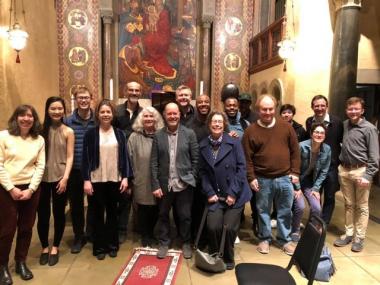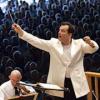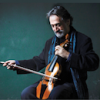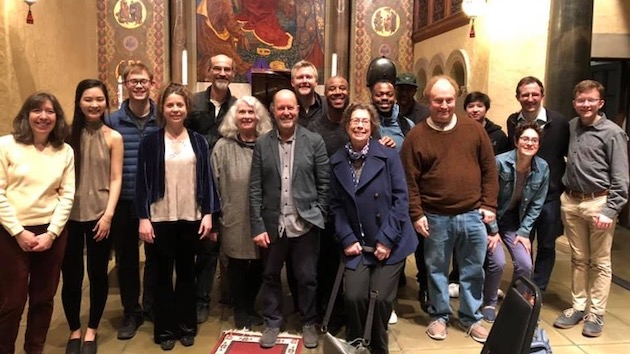
Any other summer and the 100-acre campus of the Apple Hill Center for Chamber Music would be teeming as 345 students and faculty travel from all over the world to rural New Hampshire for its Summer Chamber Music Workshop with public concerts drawing 2,500 people — but 2020 is the summer of the pandemic, and it forced a hard pause on the in-person program. Instead, Apple Hill redirected its summer session online, and Director Leonard Matczynski says the organization’s been reaching 10,000 people. It’s a nod to the reach of what Matczynski describes as the “Apple Hill family” scattered all around the world.
“We are a little microcosm of society here in New Hampshire,” said Matczynski
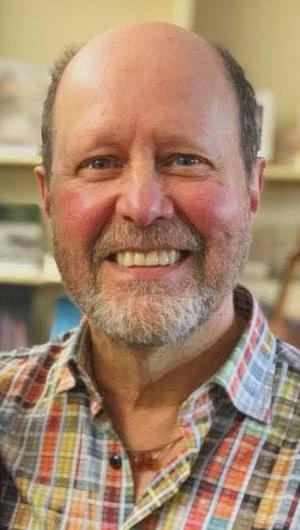
At the core of Apple Hill is the Summer Chamber Music Workshop, where students convene, either newly recruited by the Apple Hill Quartet or as returning participants. Apple Hill’s emphasis on welcoming musicians of different levels, cultures, ethnicities, orientations, genders, and economic backgrounds keeps musicians coming back. A case in point: the fellowship program Matczynski created for preprofessional musicians to spend two weeks at Apple Hill intensely working on a piece of music to be performed during a Tuesday concert.
“I wanted them to be at a camp where they saw these amateur adults playing music out of love,” said Matczynski. “And, I wanted the adults who were amateurs that never get to spend time with professional musicians or with young professional musicians [to have] the chance to be with them.”
In 1971, Apple Hill started as a summer camp for local teenagers. Over the years it has grown into an internationally respected center of chamber music, keeping its summer-camp feel but bringing in a diverse student body with its mission of inclusion, mentorship, and education and its Playing for Peace program. When Matczynski joined Apple Hill in 2008 he remembers early repertoire discussions — one person advocated for showtunes, another said Beatles tunes would draw more people. Instead, Matczynski steered Apple Hill toward a repertoire philosophy with a mix of music from the standard canon, but would include composers who are neglected, new music, unknown pieces, or music from around the globe that faculty discovered through travel, such as works from Peru by Celso Garrido Lecca or 20th-century Turkish compositions by Ahmet Adnan Saygun.
Matczynski also started a string quartet in residence. The Apple Hill String Quartet includes Elise Kuder and Jesse MacDonald on violins, Mike Kelley on viola, and Rupert Thompson on cello. Together with Matczynski, the quartet typically travels September through May as Apple Hill’s ambassadors, teaching workshops and master classes. They also give concerts wherever they visit as they recruit students for the Apple Hill Summer Chamber Music Workshop. Recruitment occurs during residencies at colleges and community centers, and also with musical-organization partners such as Boston’s Project STEP, where they offered master classes with students who later attended Apple Hill’s summer workshop on scholarship. The quartet also traveled to the Middle East in 2018 and visited refugee camps including the Zarqa camp in Jordan for Syrian children, the Ketermaya camp for Syrian refugees outside Beirut, and the Nabaa camp for Syrian and Lebanese children in Lebanon.
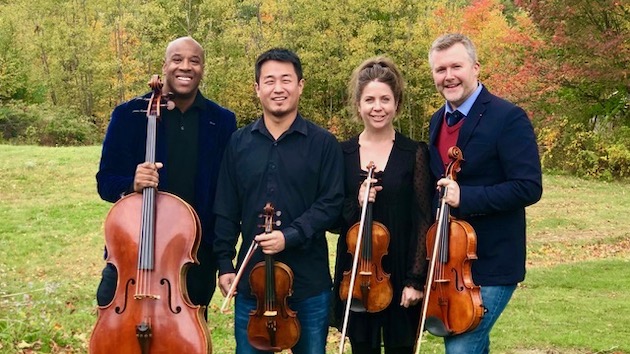
When the quartet travels, its members offer coaching in what Matczynski describes as the skills of chamber music: watching each other, listening to each other, being sensitive to each other, being flexible, and adapting. He said these skills are crucial to chamber-music rehearsal and performance, but they are more than that too.
“When you look at those skills, those are the exact same skills that people need to function with each other in society,” said Matczynski. “So, our program, it’s about music, but it’s really about leadership and citizenship and society. So, people leave here and they take those skills with them into the bigger, broader world.”
The Apple Hill Playing for Peace program started as a way for populations in conflict with one another to play together through small chamber groups without a conductor to rehearse and then perform. But what initially began as a way to bring together Israelis and Palestinians to play in chamber ensembles has expanded. One summer, a 60-something adult student was excited to learn about the Playing for Peace program and wanted to meet its participants. Matczynski told her, “You’re a Playing for Peace person” and explained she would be playing in an ensemble with several 14-year-olds and they would need to work together or the music would suffer.
“It’s about the original intent, but now it’s about everybody. Culture, ethnicity, orientation, gender, economics, religion, age, playing level — it’s all here at Apple Hill,” said Matczynski. Yet he also points out that, at the end of the day, “It’s really only about the music. We never talk peace and getting along. We talk about those skills and work with everybody on how to manage those skills to be effective as musicians.”
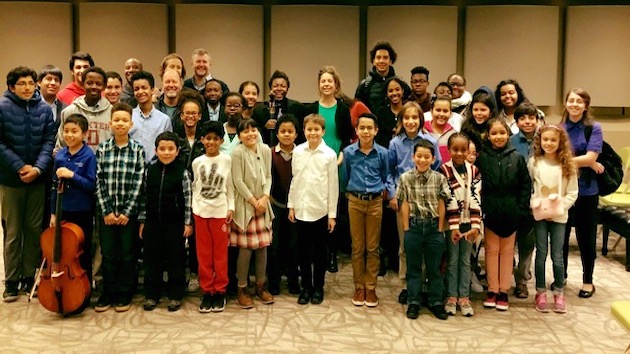
This March, the typical summer session was suspended because of COVID-19. In spite of Apple Hill’s large campus, “we decided to keep our community whole and to keep people in touch with each other because we have a large Apple Hill family from all over the world,” said Matczynski. Thus, after a series of staff and board brainstorms, the quartet came together and planned out the summer, transitioning to online programming for 2020.
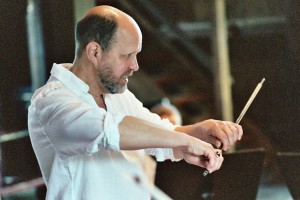
One person from the quartet figured out the online platforms and how to make videos. Another put together “the whole summer,” mapping out 10 concerts with three weeks of workshops that would feature about 20 faculty members — roughly half of what the organization usually employs. Matczynski and his business-development person got together and raised hundreds of thousands of dollars. In March, they pivoted fast and took the plunge.
“The usual development ask is, ‘Everything is going well. It’s really exciting. Why don’t you join us?’” said Matczynski. “I want to say how horrible everything is. If we don’t do such and such, we’re going to fold.”
Like other music organizations, Apple Hill found itself in a perplexing place of how to make up the shortfall of lost revenue from the Summer Workshop session tuition, around $350K–$375K. In the beginning, Matczynski described the challenges the organization faced as basic survival issues, such as how to pay everybody and how to keep the campus and its 41 buildings maintained.
“It was a very grassroots, home-based kind of thing that we did, but we did it, and it was kind of a miracle,” said Matczynski. “People really came to the table and helped us out. It was amazing.”
Over the years, Apple Hill has cultivated a tight-knit community of education and mentorship, often seeing students stick around, getting more involved, and giving back. In fact, two of the quartet members, Kelley and Kuder, started attending Apple Hill when they were 12 and are now employees. Bassist Max Zeugner performed in Apple Hill’s YouTube summer concert on Aug. 4 with pianist Yi-heng Yang; Yang started at Apple Hill over 13 years ago in a summer workshop and teaches at the Juilliard School, and Zeugner began going to Apple Hill when he was 13 years old and now plays with the New York Philharmonic.
“He had just discovered the string bass when he came to Apple Hill. He learned how to hold his bow here,” said Matczynski. “I’m not saying that Apple Hill is the reason, but we were the start for him, and he comes every summer and teaches and plays with us a lot.”
Matczynski said a variety of alumni go through a trajectory of starting at Apple Hill, many on scholarship. Later, they join the youth-development program where they attend for the summer and won’t have to pay tuition but will mentor the underage kids. From there, they will become teaching assistants during future summers. When ready, they will be guest performers for a concert at Apple Hill or around the world. Matczynski said many of them join the faculty.
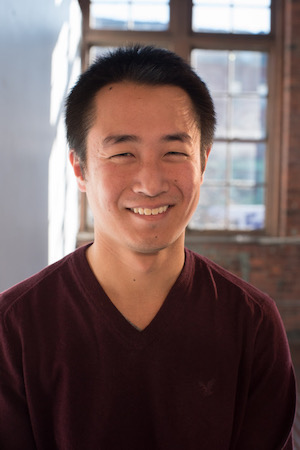
An example of this kind of trajectory is the newest member of the Apple Hill String Quartet, violinist Jesse MacDonald. He started attending Apple Hill as part of the fellowship program and later participated as part of the youth-development track, then as a teaching assistant for a few years before he joined the faculty. When the quartet had an opening, they thought of him.
In 2021, Apple Hill will celebrate its 50th anniversary, and three main goals stand out for Matczynski: building partnerships with music organizations that fuel its scholarships and help bring the diversity of students that defines Apple Hill, creating an endowment fund, and growing the organization’s online presence. The endowment fund would provide a cushion for annual operating expenses, and “it just brings more stability to the organization,” said Matczynski, who helped the organization pay off debt when he started and survive the Great Recession of 2008–2009, and hopefully now the pandemic. The move to online in 2020 is one Matczynski wants to continue after in-person workshops resume, approaching applehill.org as a “website campus,” with the organization recording everything so visitors can watch and Apple Hill can continue to grow its community.
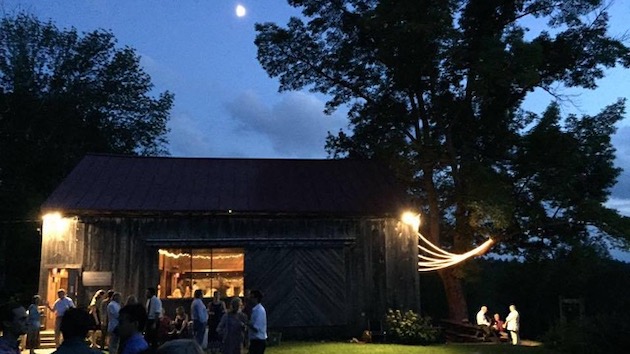
“Our whole slogan of building community through chamber music is so important right now and the fact that we have everybody here — all ages, all levels, all cultures, everything in one place — is so unusual, and I think it’s necessary, right now, especially,” said Matczynski.
The final summer session ran Aug. 10– 15 and included a lecture on the Alexander Technique with Apple Hill alumna violist Lisa Sailer, as well as a master class with Apple Hill Quartet violist Mike Kelley, along with other programming like Matczynski’s “Listening Club,” featuring music by New England composer Amy Beach. All previous 2020 summer workshop sessions and concerts can be viewed on Apple Hill’s YouTube channel.

